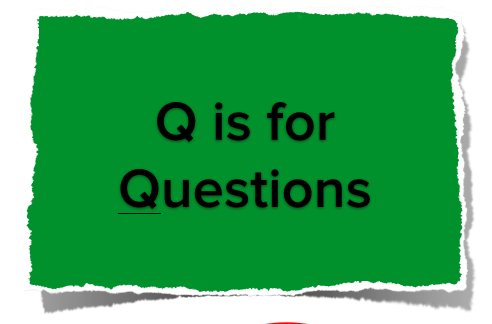Questions are important.
Actually, that's not right
Questions are VERY important
When the great master Peter Drucker passed away, several gurus remembered their interactions and experiences with Drucker in various media outlets. I had an opportunity to read many of them. The one I liked most was from Jim Collins. Collins wrote a piece in Business Week recounting his first meeting with Drucker. Collins was a young man then and his life changed completely when Drucker asked him the question "What do you want to contribute?" The rest we know is history.
One right question can change the trajectory of your life.
The questions you ask yourself can influence your worldviews, beliefs, thinking and actions. If you have a credible relationship, the questions you ask your prospects and customers can influence their worldviews, beliefs, thinking and actions.
Let me illustrate the power of questions with a story I heard from Osho
The Sufi Story
There were two disciples learning from a master. They were also close friends. Everyday they would meditate for hours inside and then go to the garden and doing walking meditation.
Both of them being smokers, they hatched a plan to ask the master for permission to smoke when they were in the garden. They thought it won't be nice to smoke inside the house but smoking the garden should be OK. They decided to seek the Master's permission next day.
Next day they checked with the Master separately.
In the evening when they started their walking meditation, one of the disciples took out his cigarette and started smoking. The other one was shocked and told the smoker that it's not wise to go against the Master's orders.
The smoker was surprised and said that when he checked with the Master, the master had given him permission to smoke.
Now, it was the first person's turn to NOT only be surprised but also to be upset that the Master had said "No" to him and had said "Yes" to his friend.
The smoker asked -- 'So what did you ask the Master?'
The non-smoker said -- 'I asked whether I can smoke while doing walking meditation?'
The smoker smiled and said -- 'OK, that explains it. I asked whether I can do walking meditation while smoking?'
I have talked about the power of questions before but this story nails it.
The way non-smoker put the question made it look like there was lack of dedication.
The way the smoker put the question made it look like he was walking the extra mile.
Note: I am not suggesting smoking is a good thing. The story is here only to make a point.
Reframing Your Questions
If we are not going in the direction that will ultimately lead us to your goals, one of the problems may be in the questions that you ask yourself. It may be time to reframe some of the questions.
Here are a few examples:
Original question: What am I getting?
Reframed question: What am I becoming?
[courtesy: Jim Rohn]
Original question: Why is this happening to me?
Reframed question: What can I learn from this?
Original question: Why can't he/she understand me?
Reframed question: How can I communicate so that he/she can understand me?
Original question: How can I get to the next position so that I am better?
Reframed question: How can I become better so that I get to the next position?
Original question: Why should I be proud of working for my company?
Reframed question: Why should my company be proud of me working for them?
Original question: How can I find a cool company to work for?
Reframed question: How can a cool company find me to work for them?
Original question: How can I get this task done?
Reframed question: What is the right configuration of resources to get this done in the most optimum fashion?
I urge you to look at some of the common questions that you ask yourself and see how you can reframe them to make them more effective. Create your own set of original and reframed questions.
If you are interested in other articles in this series so far, here they are:
A is for Alignment (title changed)
